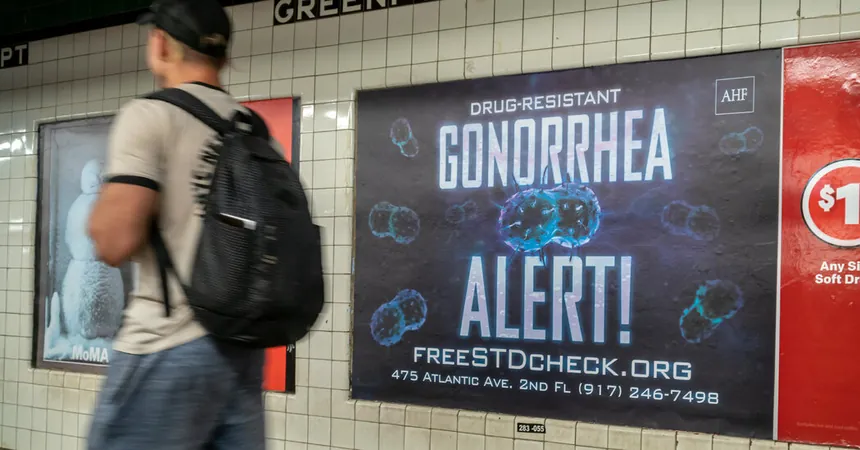
Alarming Closure: The CDC's Vital Lab for Tracking Drug-Resistant STIs Now Defunct!
2025-04-04
Author: Wei
In a shocking turn of events, the U.S. has lost a critical asset in the fight against sexually transmitted infections (STIs), particularly drug-resistant gonorrhea, a global health menace that continues to rise alarmingly. The closure of a key federal laboratory specializing in STI surveillance and research has raised concerns among health experts about the growing threat of these infections.
On Tuesday, the Centers for Disease Control and Prevention (CDC) terminated the employment of 77 dedicated scientists who played a vital role in monitoring STIs across the nation. These scientists had been responsible for gathering vital samples of gonorrhea and other STIs, analyzing genetic data to pinpoint drug resistance, and ensuring secure storage of these crucial samples. With their departure, the future of the approximately 1,000 unprocessed samples remains uncertain, as there is no one left at the CDC with the necessary expertise or software to manage this work.
One insider described the situation as "utter chaos," emphasizing how the scientists were abruptly let go without any forewarning. "We were effectively cut off mid-project, with no plan in place," the official disclosed, underscoring the disarray surrounding the lab's closure.
The urgency surrounding STI monitoring has only intensified in recent years, with new STI diagnoses in the U.S. exceeding 2.4 million in 2023, marking a staggering increase from 20 years ago. Of particular concern are the nearly 4,000 infants born with congenital syphilis last year, 280 of whom tragically did not survive.
Gonorrhea alone accounted for around 600,000 new cases in the United States in 2023. The bacteria responsible, Neisseria gonorrhoeae, can lead to severe health complications if untreated, including infertility, blindness in newborns, and potentially fatal outcomes. Alarmingly, this pathogen has developed resistance to nearly all available antibiotics, with health officials relying on a duo treatment of ceftriaxone and azithromycin—yet there are fears that even this might soon become ineffective.
For over 25 years, the CDC lab possessed the world’s largest archive of gonorrhea samples, totaling approximately 50,000 records. This extensive dataset allowed health authorities to gain insights into the evolution of the infection and monitor its resistance patterns. Yet, the fate of these crucial samples and what will be done in the absence of this dedicated research team remains a mystery.
Recent public health strategies are intensifying the need for effective gonorrhea surveillance. In a proactive move, the CDC recommended that certain high-risk groups—such as gay and bisexual men and transgender women—consider taking doxycycline as a preventive measure against STIs within 72 hours of unprotected sex. This practice, known as doxy-PEP, has already shown remarkable results in cities like San Francisco and Seattle, where STI rates have plummeted. However, there’s a growing apprehension that the widespread use of doxycycline could contribute to heightened antibiotic resistance.
Harvard researchers recently discovered a worrying trend: the percentage of gonorrhea bacteria resistant to treatment jumped to over 35% in 2023 from less than 10% just three years prior. Unfortunately, the scientists who generated this alarming data at the CDC are now among those terminated, leaving many experts questioning whether ongoing monitoring of antibiotic resistance will continue without federal support.
"This loss is catastrophic for public health," remarked Dr. Jenell Stewart, an infectious disease specialist at Hennepin Healthcare. "We are at a crossroads where national surveillance for gonorrhea resistance may be left in the dust without a dedicated laboratory."
Research efforts aimed at studying doxy-PEP in women now hang in the balance as funding has been cut for multiple related grants. Meanwhile, commercial labs can test for STIs but lack the capability to assess the drug resistance of gonorrhea specifically. Only the CDC scientists developed the means for testing treatment responses, and without them, drug sensitivity testing may effectively come to an end.
As experts weigh the implications of this closure, a stark message emerges: "You cannot have a national surveillance system without a national lab," warns one leading scientist who chose to remain anonymous. Meanwhile, as the CDC's scientists were working to develop more accurate tests for syphilis—tests that could identify active infections and not just past cases—the lab's abrupt demise raises further alarms about the future direction of public health in America.
In a time when STI rates are soaring, the ramifications of this closure could be nothing short of dire. As the health community grapples with this shocking loss, vigilance and advocacy for reinstating a robust STI surveillance system are more crucial than ever. Stay tuned for ongoing coverage as we uncover the fallout from this critical public health development!




 Brasil (PT)
Brasil (PT)
 Canada (EN)
Canada (EN)
 Chile (ES)
Chile (ES)
 Česko (CS)
Česko (CS)
 대한민국 (KO)
대한민국 (KO)
 España (ES)
España (ES)
 France (FR)
France (FR)
 Hong Kong (EN)
Hong Kong (EN)
 Italia (IT)
Italia (IT)
 日本 (JA)
日本 (JA)
 Magyarország (HU)
Magyarország (HU)
 Norge (NO)
Norge (NO)
 Polska (PL)
Polska (PL)
 Schweiz (DE)
Schweiz (DE)
 Singapore (EN)
Singapore (EN)
 Sverige (SV)
Sverige (SV)
 Suomi (FI)
Suomi (FI)
 Türkiye (TR)
Türkiye (TR)
 الإمارات العربية المتحدة (AR)
الإمارات العربية المتحدة (AR)